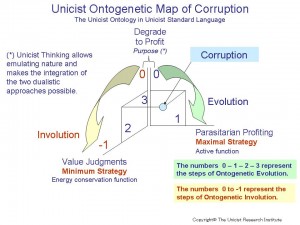The Unicist Approach to Corruption and its Antidotes
This is a synthesis of a research, led by Peter Belohlavek, which began in July 1975 and ended in February 2013 when it was proven that the avoidance of corruption depends on individual behavior and not on the conditions of the environment.
 Corruption allows individuals to profit from the environment through illegitimate actions while they disintegrate the system they are part of. It is based on a “parasitarian” complementation that uses value judgments to justify the degradation of the environment they do in order to profit from it.
Corruption allows individuals to profit from the environment through illegitimate actions while they disintegrate the system they are part of. It is based on a “parasitarian” complementation that uses value judgments to justify the degradation of the environment they do in order to profit from it.
Corruption is an individual and social addiction that is installed in environments where the participants do not have the necessary critical mass to influence the environment.
Corrupt environments need that their dominant ethics is intentions driven, their justice does not cover the needs of equal opportunities and that the private and public actions of individuals are not transparent.
Corruption may occur in any human action field. It can be included in the emotional, economic, social and political aspects of human behavior. The most known aspects deal with economic and power corruption.
The final purpose is to profit from the environment. To obtain this benefit corrupts adopt four types of actions: sabotage, blackmailing, bribing and defrauding. As it is an addiction, corrupts build a parallel reality in which corruption is a natural and accepted behavior.
Psychopathic manipulation and psychopathic leadership are the natural “tools” corrupts use to develop their actions when they deal with non-corrupt participants of an environment.
Corruption is illegal or socially sanctioned in non-corrupt environments. In corrupt environments corruption is a fallacious myth that covers the shared weaknesses of the members. Those who do not accept it are automatically excluded from the groups.
The antidote for corruption, at an individual level, is the critical mass individuals or their actions have to influence the environment.
Social corruption antidotes require the existence of transparency, functional and not intentional ethics and the existence of equality of opportunities for the members.
But the conclusion of the research was that the responsibility for corruption avoidance is a personal decision.
Unicist Press Committee
NOTE: The Unicist Research Institute was the pioneer in complexity science research and became a private global decentralized world-class research organization in the field of human adaptive systems.
http://www.unicist.org